Destiny: A foster child with Down syndrome Finds His Forever Mom
September 29th, 2018 by Global Down Syndrome Foundation
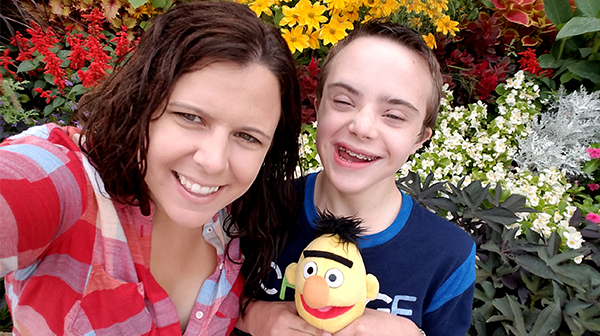
From Down Syndrome World 2018 Issue 2 of 4
When people first meet 15-year-old Brett Logan, they see a charismatic young man full of joy, laughter, and love. What they don’t see at first glance are the many struggles he has overcome to get to where he is.
From the time Brett was just an infant, he faced severe, life-threatening medical challenges. Doctors questioned if he would live into his adolescent years. Defying the odds, Brett prevailed. But in addition to being a medically fragile child with Down syndrome, Brett developed complex behavioral and social difficulties as a result of the neglect and abuse he endured during his upbringing. One evening when Brett was 8 years old, the local Department of Human Services found him wandering the streets of Greeley, Colorado, by himself in filthy clothes and no shoes. He was sent from foster home to foster home, never truly getting a chance to reach his potential.
A ROUGH START
Born with two heart defects, Brett was diagnosed with failure to thrive. At 20 months old, he had both croup and the flu, which caused his heart to stop and required weeks in the intensive care unit at Children’s Hospital Colorado. During that time, he became addicted to sedation medication and had to be treated with methadone.
When Brett began school, he w as delayed in all areas of development, ranging from nutrition to verbal language. At age 8, Brett was transferred from a different school district into then 22-year-old Jennifer Nelson’s class.
“He was very tiny — about the size of a 3 y ear old at age 8,” Jennifer recalled of the young Brett. “But through all that, I knew there was something really special about him. He had me wrapped around his finger from day one, and we developed a really close student-teacher bond.”
As the school year went on, Jennifer fell in love with Brett’s infectious personality. “He is really loving, empathetic, and funny,” Jennifer said. “He can always make me laugh, and he truly loves others like nobody I’ve ever met.”
After a year of being Brett’s teacher and getting to know him, the 23-year-old, barely out of college, took a life -changing gamble and adopted Brett. At the start of their journey, “they told us he was too old and if he hadn’t learned yet, he wasn’t going to,” Jennifer recalled.
“They were so wrong!”
Brett is now a sophomore in high school, more active and happier than ever before.
BECOMING A FAMILY
After a court hearing where it was clear that Brett would not be returning to his last home, Jennifer stepped up.
“I had decided pretty early on that I wanted to adopt him,” she said. “So many people had given up on him in his life, and I knew he deserved more. Somehow destiny brought us together.”
In 2015, Jennifer and Brett officially became a family. For the first time in his life, Brett had a real home.
“I was happy!” Brett said of learning Jennifer would be his adoptive mother. “My favorite thing about being adopted is that I get to sleep in my bed every night.”
“I will admit, it was very challenging at the beginning,” Jennifer said. “I became a parent of a 9-year-old overnight, when I was just barely out of college myself. I knew he was capable of learning. He just needed someone to teach him.”
THE POWER OF POSITIVITY
With the proper nutrition and medical care, Brett has grown in everyway imaginable, Jennifer said. He is physically larger, very verbal and talkative, and learns new things everyday.
Now a student at Legend High School in Parker, Colorado, Brett has a full calendar with show choir and varsity cheerleading. Off campus, Brett is involved in a number of extracurricular activities as a multi-sport Special Olympics athlete, Junior Denver Broncos Cheerleader, and active participant in Global Down Syndrome Foundation’s Dare to Cheer Camps. In fact, this will be his fourth year attending Dare to Cheer.
His newest interest, modeling, got him on the runway with Sam Cronin, a midfielder for the Minnesota United Major League Soccer team, at Global’s 2017 Be Beautiful Be Yourself Fashion Show.
“I loved everything about the fashion show,” Brett said. “I hope I get to be in it again someday. I loved dancing on the runway with all the cameras on me and the whole crowd cheering! My buddy Sam was awesome. He even gave me a piggyback ride after the show and waited with me until my mom got back.”
Brett still deals with medical challenges, including epilepsy, sleep apnea, and hypothyroidism, all of which have a higher prevalence in people with Down syndrome. But he takes them in stride and continues to prevail. In 2015, he was named an ambassador for Children’s Hospital Colorado for his perseverance through all his treatments.
“I love my doctors at Children’s Hospital, so it was great to be involved,” Brett said. “I got to meet other kids who also battle health issues, and it was great to just be me!”
Brett and his mother don’t know what the future holds, but are excited for all the possibilities that lie ahead.
“Don’t let anyone tell you that something is impossible,” Brett said. “I am proof that challenges can be over come and that you can do anything you put your mind to.”
BRETT LOGAN, IN HIS OWN WORDS
Favorite subject at school: “Guitar, because my teacher lets me have the stage and put on performances for my class.”
Favorite way to make people laugh: “By showing off my muscles or my dance moves!”
Best part of Dare to Cheer Camp: “I love hanging out with my friends and cheering for the audience.”
On being a Junior Denver Broncos Cheerleader: “I love my coaches Jozie and McKenna! They are my favorite part of cheer. I also love performing at the Bronco games. One time Demaryius Thomas threw a football to me on the sidelines!”
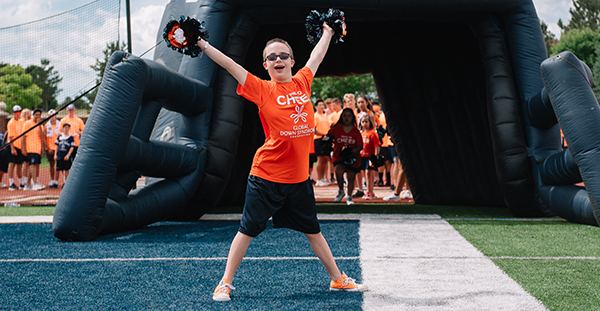
Like this article? Join Global Down Syndrome Foundation’s Membership program today to receive 4 issues of the quarterly award-winning publication, plus access to 4 seasonal educational Webinar Series, and eligibility to apply for Global’s Employment and Educational Grants.
Register today at downsyndromeworld.org!
Making History: First-Ever Gerber Baby with Down Syndrome
September 27th, 2018 by Global Down Syndrome Foundation
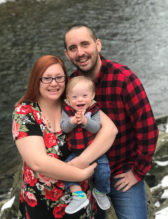
From Down Syndrome World 2018 Issue 2 of 4
In February 2018, a little boy with Down syndrome took the world by storm with his contagious smile, bright blue eyes and charming personality. His name is Lucas Warren, and he’s the first-ever Gerber Spokesbaby with Down syndrome.
The nearly century-old Gerber Products Company is an iconic brand that sells baby food and baby products. Often recognized by its trademark logo, a drawing of the first Gerber Baby, Ann Turner Cook, the company selects a new Gerber Spokesbaby each year. The 1-year-old from Dalton, Georgia, was chosen from 140,000 other contestants to be the Gerber Spokesbaby for the entire year. The Gerber brand personifies the healthy, happy, perfect baby. Choosing Lucas as the 2018 Gerber Spokesbaby challenges negative stereotypes about people with Down syndrome and makes an important statement about inclusion and diversity of those who are differently-abled. Global was able to share the excitement of this historical moment during an exclusive interview with Lucas’ parents, Cortney and Jason Warren.
DOWN SYNDROME WORLD™: TELL US ABOUT THE MOMENT YOU LEARNED LUCAS WON THE GERBER CONTEST.
Cortney and Jason: Our first reaction was shock and doubt, followed by extreme excitement for Lucas! We weren’t able to tell our families and friends until after it was announced.
WHAT AN EXCITING TIME SINCE LUCAS WON! HE HAS MILLIONS OF FANS ON SOCIAL MEDIA, AND EVEN INTERVIEWS ON THE TODAY SHOW. WHAT IS IT LIKE TO BE FAMOUS?
It is a proud moment for us as par ents knowing that Lucas has a platform to spread joy, not only to people he comes in contact with daily but to people all over the U .S. We are so happy that he will have this moment to look back on in the futur e and feel proud.
WHAT ARE LUCAS’ RESPONSIBILITIES AS THE 2018 GERBER SPOKESBABY?
Lucas will represent Gerber in advertisements, social media, and more throughout the year, representing joy and love. In addition, he receives $50,000 for his Spokesbaby title, which we plan to use toward his education.
WHAT HAS SURPRISED YOU ABOUT LUCAS?
What has surprised us the most about Lucas is Lucas himself. Being our first child, and having Down syndrome on top of that, everything is new to us. Seeing him pick up on milestones faster than what doctors and therapists say he should makes us feel so proud of him. He continues to show his doctors, therapists, friends, and family that there are no limits for him.
WHAT DO YOU HOPE HAVING LUCAS AS THE GERBER SPOKESBABY WILL DO FOR THE DOWN SYNDROME COMMUNITY AND SOCIETY IN GENERAL?
We hope this announcement will impact ever yone and shed light on the special needs community. We hope Lucas as the Gerber Spokesbaby will help educate more people that individuals with special needs should be accepted, not limited, and therefore have the potential to change the world.
Like this article? Join Global Down Syndrome Foundation’s Membership program today to receive 4 issues of the quarterly award-winning publication, plus access to 4 seasonal educational Webinar Series, and eligibility to apply for Global’s Employment and Educational Grants.
Register today at downsyndromeworld.org!
Global President & CEO Michelle Sie Whitten Takes a Stand
September 13th, 2018 by Global Down Syndrome Foundation

REALLY? Insulting people who are victims of sexual abuse and people who were incensed by crass racist comments wasn’t enough? ANOTHER NETFLIX comedian has to take a swing at people with Down syndrome?
And while the Tonight Show starring Jimmy Fallon did the right thing and CANCELLED Norm Macdonald’s scheduled appearance on it show, NETFLIX is once again supporting the “R” word, disparaging comments about people with Down syndrome, and even social media promoting violence against advocates for people who are differently-abled.
The WILL of the people defending against sexual and abuse and racism was heard. I am counting on those same people to come together for those who are differently-abled and make sure this population also has a STRONG a VOICE. PLEASE. Let us come together and send Netflix a message to CANCEL THIS SHOW! And if they don’t cancel the show, consider cancelling your NETFLIX subscription. For a day, a month, anything that shows power in numbers WHO CARE.
For Norm, glad you apologized. But REALLY? You needed a word for “stupid” and you came up with “Down syndrome”? I call on you to spend a day with a person with Down syndrome and then see if you can’t come up with a better word.
To be clear, at the Global Down Syndrome Foundation, we are grateful for the freedoms we have in the US – including freedom of speech. AND YET, we also believe there are words that we are free to use, but as a society choose not to use because they are so directly tied to discrimination against a vulnerable population. What we are asking for is not too much or too difficult. There are lots of depraved topics that are funny (disclosure – I’m half NJ Italian) that don’t lend themselves to discrimination or oppression. So, you can still get that cheap laugh and feel good about yourself.
It’s time to call NETFLIX out. Seriously, AGAIN, we have nothing to lose.
Michelle Sie Whitten, President and CEO, Global Down Syndrome Foundation
Babies with Down syndrome take center stage in the US abortion fight
March 5th, 2018 by Global Down Syndrome Foundation
Global CALLS OUT NETFLIX for anti-disability,anti-Down syndrome rhetoric
January 19th, 2018 by Global Down Syndrome Foundation

With the #Metoo movement in full swing and the 1st Anniversary of the Women’s March looming, it’s shocking to see Netflix promoting its newest stand-up show aptly called “Disgraceful.” Netflix promotes the show by claiming its comedian “…gives voice to the sordid thoughts you’d never say out loud, with blunt musings on porn, parking lot power struggles, parenthood and more.”
Apparently sordid thoughts about the disabled and people with Down syndrome are fair game. In fact, the show’s anti-disability sketch was deemed so funny by Netflix that it is used in their trailer.
At the Global Down Syndrome Foundation we are grateful for the freedoms we have in the US – including freedom of speech. AND YET, we also believe there are words that we are free to use, but as a society choose not to use because they are so directly tied to violence against a vulnerable population. I would argue the ‘R’ word is exactly such a word – witness Willowbrook, NY to Pueblo, CO today. The best essay I have read on this subject is written by our board member and renowned actor, John. C. McGinley (after you read it you will have a “Captain My Captain” moment).
Sometimes it is hard to advocate. I’m a working mom, I’m perpetually tired so I get it. But we can all take a moment to post, like, share, or petition. And WHY NOT demand Netflix to:
- Edit out the anti-disability and anti-Down syndrome rhetoric in the show?
- Immediately take the appalling sketch out of their trailer?
- Issue an apology for failing to use humanity as the demarcation line for comedic depravity?
What we are asking for is NOT too much or too difficult. There are lots of depraved topics that are funny (disclosure – I’m half NJ Italian) that don’t lend themselves to violence or oppression. So, you can still get that cheap laugh and feel good about yourself.
It’s time to call folks out. Seriously, we have nothing to lose.
Michelle Sie Whitten, President and CEO, Global Down Syndrome Foundation
Read John C. McGinley’s essay, Spread the Word to End the Word
Global Down Syndrome Foundation Responds To Shocking Report – Shares Translated Prenatal Testing Information With Iceland
January 11th, 2018 by Global Down Syndrome Foundation
DENVER | The Global Down Syndrome Foundation announced today that it has translated important prenatal testing information into Icelandic and provided the resource to the Icelandic Down Syndrome Association. The translation is a first step to support the association’s efforts in providing accurate information about Down syndrome to pregnant women and families in Iceland.
Global and the National Down Syndrome Congress (NDSC) offered to provide the translation of their recently published Prenatal Testing & Information About Down Syndrome following a CBS news report in August about the termination rates of Down syndrome pregnancies in Iceland.
According to the report, “Since prenatal screening tests were introduced in Iceland in the early 2000s, the vast majority of women — close to 100 percent — who received a positive test for Down syndrome terminated their pregnancy.” In actuality, from 2007 to 2015, nearly 85% of pregnant women opted for Down syndrome screening and, of those who received an amniocentesis resulting in a positive test result for Down syndrome, 100% terminated.
The best available statistics in the U.S. are that an estimated 67 percent of women who receive an amniocentesis resulting in a positive test result for Down syndrome choose to terminate their pregnancies. But more than 95 percent of pregnant women don’t even elect to receive an amniocentesis.
“The high termination rates in Iceland are alarming,” said Michelle Sie Whitten, President and CEO of the Global Down Syndrome Foundation. “Every woman and every pregnancy is unique, but every woman should be given the facts including examples of how people with Down syndrome can and are contributing to society and reaching their potential. In the U.S. the situation is very different than Iceland – there is actually a population explosion of people with Down syndrome because of increased births and a more than doubling of the lifespan. Our problem is that funding for research and medical care has declined precipitously over the last two decades and we need to change that.”
“Global has been such a great partner to work with on our prenatal testing pamphlet and we are so pleased to offer it in Icelandic,” said David Tolleson, Executive Director of the NDSC. “The NDSC is offering scholarships to families from Iceland to attend our national convention in July of this year, and we believe it will serve as a great resource for people from Iceland to bring some best practices back to their country. We also look forward to learning from our colleagues in Iceland.”
“We appreciate Global and NDSC for extending support to the Down syndrome community in Iceland. Their generosity and moral support is very important for a small society as ours. And how wonderful to be part of this larger Down syndrome family, all sharing the same beliefs and hopes for people with Down syndrome,” said the Icelandic Down Syndrome Association President, Thordis Ingadóttir.
Watch C-Span cover the 5-minute testimony of Global Down Syndrome Foundation’s Quincy Jones Award Advocate, Frank Stephens, about Iceland and the future of people with Down syndrome.
Below are several trends associated with Down syndrome based on data in the United States:
- Population – ranges between 230,000-430,000
- Live Births – have increased to 1 in 691 today from 1 in 1,000 in 2002
- Lifespan –There have been great strides in medical care and lifespan has more than doubled to 60 years from 28 years in the 1980s
- Low Government Funding – Despite being the leading cause of developmental delay in the U.S. and the world, Down syndrome is one of the least funded genetic conditions by the National Institutes of Health (NIH) and has been since 2001.
- Education – By law, people with Down syndrome must be provided a free, appropriate education through their public school system.
- Societal Trends – A small but growing number of people with Down syndrome are choosing to live independently, participate in post-secondary education or college programs, and get married.
For the most current, accurate information and resources associated with people with Down syndrome visit www.globaldownsyndrome.org/facts.
###
About the Global Down Syndrome Foundation
The Global Down Syndrome Foundation is at the forefront of research, medical care, education and advocacy dedicated to significantly improving the lives of people with Down syndrome. Supporting the research of hundreds of scientists around the world, and through our advocates, partners and affiliates including the Crnic Institute for Down Syndrome and the Anna and John J. Sie Center for Down Syndrome, Global is making an impact on the lives of people with Down syndrome today, and remains focused on finding solutions tomorrow. We are committed to helping people with Down syndrome realize their fullest potential and to lead healthy and productive lives. To learn more, visit www.globaldownsyndrome.org.
Be Beautiful Be Yourself Dancers to Perform in “Nutcracker”
December 2nd, 2017 by Global Down Syndrome Foundation
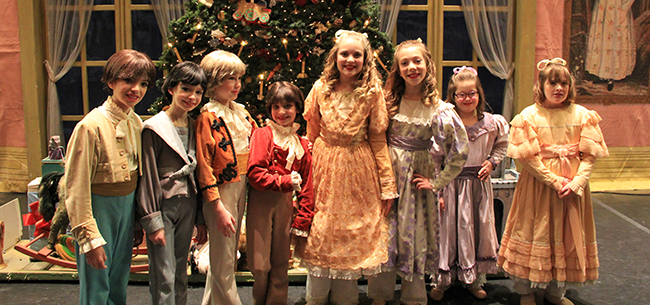
Colorado Ballet Academy Students with Cora Jane and Kristina
Two ballet students from the Global Down Syndrome Foundation’s Be Beautiful Be Yourself Dance Class have been cast by the Colorado Ballet for their official production of the holiday classic “The Nutcracker.” Both students are part of the ensemble of children partygoers and will have plenty of stage time to show off their dance skills and shine!
Global’s star student, Cora Jane Thompson, will perform in the Thursday, Dec. 7th, showing and star student, Kristina Penfield, will perform in the Thursday, Dec. 14th showing. Both students will perform in the prime time 7:30pm showing of The Nutcracker at the Ellie Caulkins Opera House, 1101 13th Street in Denver.
Please support Global’s star students and our partner, the Colorado Ballet, by purchasing tickets to The Nutcracker performances on Thursday December 7th and Thursday December 14th at 7:30pm!!
The Global Down Syndrome Foundation’s Be Beautiful Be Yourself Dance Program is made possible by generous grants from the Melvin & Elaine Wolf Foundation, The Daniels Fund, and the Anna and John J. Sie Foundation.
Global is deeply grateful to its program donors and to our partners – the Colorado Ballet and the Sie Center for Down Syndrome at Children’s Hospital Colorado. Our Be Beautiful Be Yourself Dance Class runs for two seasons a year. Each 16 week season is taught by Colorado Ballet professionals alongside Sie Center physical therapists and educators. The program provides instruction on ballet movement, music appreciation, rhythm and basic dance steps as well as interpersonal skills, vocabulary and confidence building to students ages 5-14 who happen to have Down syndrome.
The program is designed as both a confidence builder to dance classes with typical peers and as a stand-alone dance class that gives students with Down syndrome the opportunity to make friends who also have the condition.
Over 30% of our students are scholarship recipients – to support the Be Beautiful Be Yourself Dance Class and our students in need, please make a donation today!
Congratulations, Cora Jane and Kristina! We are so proud of how hard you worked to be cast in The Nutcracker! GOOD LUCK! We know you will SHINE!
 Colorado Ballet Dancers Mackenzie Dessens and Gregory K. Gonzales with Kristina and Cora Jane |
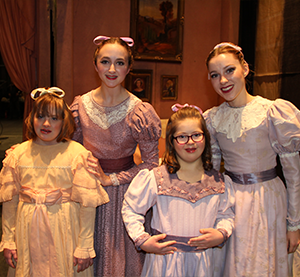 Colorado Ballet Studio Company Dancers with Kristina and Cora Jane |

Watch our dancers featured on CBS 4 Denver here!

Watch our dancers featured on Colorado’s Best on Fox 31 here!
A SPECIAL THANKS TO OUR PROGRAM SUPPORTERS
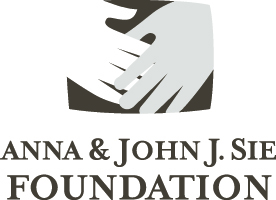 |
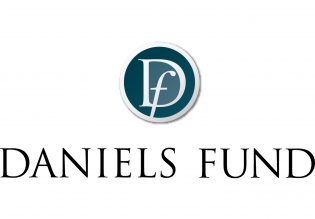 |
 |
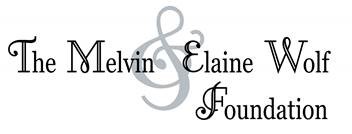 |
A SPECIAL THANKS TO OUR PROGRAM PARTNERS
 |
 |
A SPECIAL THANKS TO OUR IN-KIND DONORS
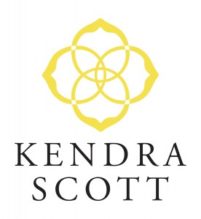 |
 |
The Salah Foundation Provides Lead Gift To Global Down Syndrome Foundation Capital Project
November 20th, 2017 by Global Down Syndrome Foundation
Generous $1 million grant will help establish a much-needed education center at Global’s new international HQ in Denver
Media Contacts:
Kathy Green | kgreen@globaldownsyndrome.org | (720) 280-9725
Anca Call | acall@globaldownsyndrome.org | (720) 320-3832
DENVER – The Global Down Syndrome Foundation (Global) today announced a transformative lead gift of $1 million from The Salah Foundation. Combined with the generous $1 million grant, Global will receive additional matching funds that will help to establish a center in Denver dedicated to educational activities primarily for people with Down syndrome but also for others who are differently-abled.
The gift was unveiled by Noreen Salah Burpee, executive director of The Salah Foundation, at Global’s annual record-breaking Be Beautiful Be Yourself Fashion Show held on Nov. 11, 2017, at the Sheraton Denver Downtown Hotel. The announcement brought a crowd of more than 1,300 including advocates with Down syndrome, their families, friends, supporters, and celebrities Quincy Jones, Jamie Foxx, DeOndra Dixon, Marisa Tomei, Joe Manganiello, John C. McGinley, Matt Dillon and Eva Longoria to their feet.
“We are so grateful for The Salah Foundation and Noreen for making this generous and impactful gift to the Global Down Syndrome Foundation,” said John C. McGinley, award-winning actor and Global board member after hearing the announcement backstage at the fashion show. “The team at Global works hard and is truly delivering for the Down syndrome community. This will allow them to reach even more people.”
“We are thrilled to support the work of the Global Down Syndrome Foundation as they continue to create extraordinary change in the lives of people with Down syndrome and their families,” said Salah Burpee. “We hope that others will follow suit and open their hearts and wallets to this important project.”
The education center will be housed in Global’s new international headquarters in Denver in the Cherry Creek Shopping North – one of the most popular districts in Colorado with the fastest growing foot traffic. It is anticipated that the multi-use education center will provide cooking classes, computer labs and other center-based educational programs for varying ages and abilities and will open sometime in the second half of 2018.
Global supports the research of hundreds of scientists around the world and helped establish the first and only academic home for Down syndrome research at the Crnic Institute for Down Syndrome at the University of Colorado School of Medicine at the Anschutz Medical Campus, with a focus on Alzheimer’s disease, cancer, and autoimmune disorders.
Global funding also helps provide the highest quality of comprehensive medical care to thousands of children with Down syndrome from around the world through the Sie Center for Down Syndrome at Children’s Hospital Colorado, coordinating medical care, along with therapies including speech, physical and occupational therapy.
“We are grateful for the continued support of The Salah Foundation as we advance our mission,” said Michelle Sie Whitten, president and CEO of the Global Down Syndrome Foundation. “Noreen, Fred, Megan and the whole Salah family have believed in our work, provided us guidance to expand, and now have given us this extraordinary gift that simultaneously increases our impact on people with Down syndrome and helps ensure my parents’ legacy. I can’t tell you how meaningful that is to us.”
###
About The Salah Foundation
The Salah Foundation is a private foundation, by invitation only, that supports non-profit organizations in the United States that strengthen families and communities and advances individuals to become productive and responsible citizens. There is a special interest in education, medical research, community development, and self-sufficiency programs aimed at the economically disadvantaged, the young, the elderly and the disabled. To learn more, visit www.salahfoundation.org.
About the Global Down Syndrome Foundation
The Global Down Syndrome Foundation is at the forefront of research, medical care, education and advocacy dedicated to significantly improving the lives of people with Down syndrome. Supporting the research of hundreds of scientists around the world, and through our advocates, partners, and affiliates including the Crnic Institute for Down Syndrome and the Anna and John J. Sie Center for Down Syndrome, Global is making an impact on the lives of people with Down syndrome today, and remain focused on finding solutions tomorrow. We are committed to helping people with Down syndrome realize their fullest potential and lead healthy and productive lives. To learn more, visit. www.globaldownsyndrome.org.
National Down Syndrome Adoption Network
November 6th, 2017 by Global Down Syndrome Foundation
All Children Deserve The Safety And Security Of A Loving Home.

In 1981, Robin and David Steele visited a children’s home in Cincinnati and fell in love with a little girl named Martha. After initially being told Martha was not available for adoption because she w as born with Down syndrome, the Steeles persisted — both adopting Martha and establishing the National Down Syndrome Adoption Network (NDSAN) so no other child with Down syndrome would ever be considered “unadoptable.”
 This article was published in the award-winning Down Syndrome World™ magazine. Become a member to read all the articles and get future issues delivered to your door!
This article was published in the award-winning Down Syndrome World™ magazine. Become a member to read all the articles and get future issues delivered to your door!FOREVER HOMES
A program of the Down Syndrome Association of Greater Cincinnati (DSAGC), NDSAN is a free registry (not an adoption agency) that connects birth and adoptive families across the U.S. The Steeles — who eventually adopted four more children with Down syndrome and six other children who are differently-abled — recently stepped back from the organization but are still committed supporters. Since 2010, NDSAN has been under the capable leadership of Stephanie Thompson, who spent the previous 11 years working for DSAGC.
When birth parents call NDSAN, Thompson answers their questions and provides educational resources about raising children with Down syndrome to help allay any fears that might accompany the diagnosis. If they decide to give a child up for adoption, she helps them develop a birth plan.
Families interested in adopting a child with Down syndrome can contact NDSAN after completing a home study. Thompson then searches NDSAN’s database for children who might be a good fit. Children with Down syndrome often have unique medical and developmental needs, and it is important that the family be a good fit for the child and vice versa. Thompson also helps get an adoption agency involved, if necessary, and continues to provide support after a child joins his or her new family.
“I can empathize with both adoptive and birth parents,” said Thompson, who has a 25-year-old son with Down syndrome. “I know how it feels to get a diagnosis of Down syndrome, and through that connection, birth parents feel comfortable asking me questions. If they want to make an adoption plan, I have a wonderful relationship with all of the adoptive families on our registry, whom I’m helping as well. It means the world to me these folks feel called to adopt a child with Down syndrome.”
“When we first learned of our son’s condition, we felt that there was little choice for us,” one family wrote in a letter to Thompson. “We may have made a very different decision if it w as not for your organization.”
EDUCATION AND OUTREACH
Thompson wants everyone involved in the adoption process to have the most up-to-date information about Down syndrome, and that includes medical professionals. NDSAN publishes booklets for healthcare providers so they can educate patients about all their options.
“If termination is talked about, we want adoption talked about as well,” she said.
She’s also reaching out to Down syndrome organizations that can help spread the word to members about both adoption and the many foster children with Down syndrome in their areas looking for forever homes.
“This can be a very emotional job,” Thompson said.
“But I can’t imagine doing anything else.”
Each year, the National Down Syndrome Adoption Network is contacted by approximately 125 expectant families, birth families, and agencies and helps 40 children find their adoptive families.
The article was published in Down Syndrome World™ magazine. Become a member to read the whole magazine and get future magazines delivered to your door!
Like this article? Join Global Down Syndrome Foundation’s Membership program today to receive 4 issues of the quarterly award-winning publication, plus access to 4 seasonal educational Webinar Series, and eligibility to apply for Global’s Employment and Educational Grants.
Register today at downsyndromeworld.org!
Global Down Syndrome Foundation announces new collaboration for groundbreaking Down syndrome – Alzheimer’s disease research project
October 18th, 2017 by Global Down Syndrome Foundation
$2.5 million initial commitment to launch project
DENVER –The Global Down Syndrome Foundation today announced that Biogen, a neuroscience leader has joined the Global Down Syndrome Foundation and the University of Colorado School of Medicine in a groundbreaking project that explores the connection between Alzheimer’s disease and Down syndrome.
The Crnic Institute Human Trisome ProjectTM (HTP) is an ambitious longitudinal and cross-sectional study that will recruit 1,000 individuals with Down syndrome (also known as Trisomy 21) and 500 typical individuals. Scientists and clinicians will sequence and study several layers of genomics information (all de-identified) from a single sample of blood. Saliva, stool and other samples are also being collected. The Crnic Institute HTP has already begun to significantly increase the speed of Down syndrome research and has enrolled nearly 300 participants in the first 11 months.
“People with Down syndrome have a different disease spectrum,” said Dr. Joaquín Espinosa, executive director of the Crnic Institute, and the principal investigator of the Crnic Institute HTP. “The Crnic Institute HTP will allow us to redefine Down syndrome from the least scientifically understood condition to one of the best understood conditions. In addition, it will provide unprecedented understanding of Alzheimer’s disease, autoimmune conditions, cancers and other medical conditions that people with Down syndrome are either very predisposed to or protected from, eventually enabling the development of new diagnostic and therapeutic tools.”
“This research will serve first and foremost people with Down syndrome, but also the millions of individuals without Down syndrome who are affected by the many medical conditions modulated by trisomy 21,” said Espinosa.
Biogen has committed more than $500,000 and additional in-kind resources to the Crnic Institute HTP to investigate the genome and epigenome of specific cell types in the blood that could inform the development of Alzheimer’s disease. This initial investment is being financed with funds from Biogen and $1 million from the University of Colorado School of Medicine at the Anschutz Medical Campus – home to the Linda Crnic Institute for Down Syndrome – with a matching gift of $1 million from the Global Down Syndrome Foundation.
“Down syndrome is still one of the least funded genetic conditions of the federal government, so we are extremely grateful for the commitment from CU and Biogen,” said Michelle Sie Whitten, president & CEO of the Global Down Syndrome Foundation. “This is just the beginning as we hope to attract other biopharmaceutical organizations and philanthropists committed to improving the lives of people with Down syndrome and other conditions.”
“The School of Medicine provides a home for outstanding biomedical research that leads to improved care for all,” said Dr. John J. Reilly, Jr., vice chancellor for health affairs and dean of the University of Colorado School of Medicine. “We are confident that this investment will have a significant impact on our understanding of the health of people with Down syndrome and that it will lead to discoveries informing the care we provide.”
“Our son is 38 years old and we are concerned that he may get Alzheimer’s,” said Jack and Penni Dorwart, whose son participated in the Crnic Institute HTP. “We also know that if we have high- quality research that there is the potential to significantly improve not only our son’s life but millions of others with Down syndrome who have many other medical issues that prevent good quality of life. That is why we participated in this study and we encourage others to do the same. We are grateful to the Crnic Institute and the Global Down Syndrome Foundation for taking on this difficult work and advocating for our children and adults.”
Learn more about in the Crnic Institute Human Trisome ProjectTM or sign up to participate in the study.


 Experience our inspirational and groundbreaking videos and photos. Our children and self-advocates are beautiful AND brilliant!
Experience our inspirational and groundbreaking videos and photos. Our children and self-advocates are beautiful AND brilliant! Make sure your local Representatives are on the Congressional Down Syndrome Task Force.
Make sure your local Representatives are on the Congressional Down Syndrome Task Force.